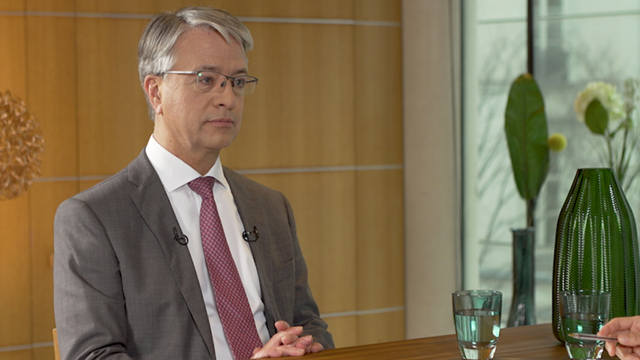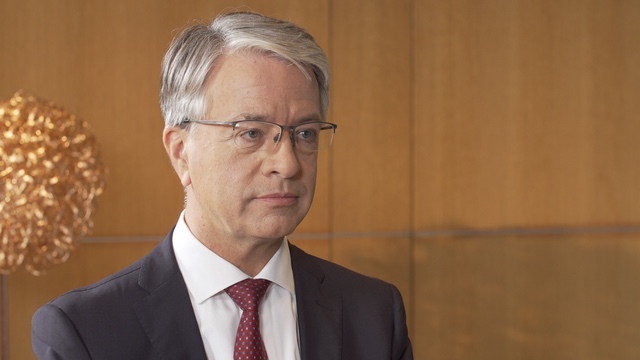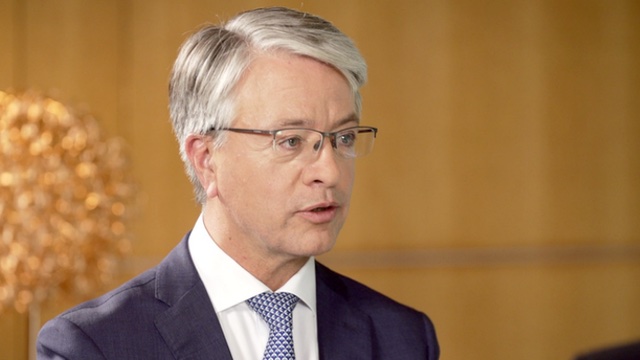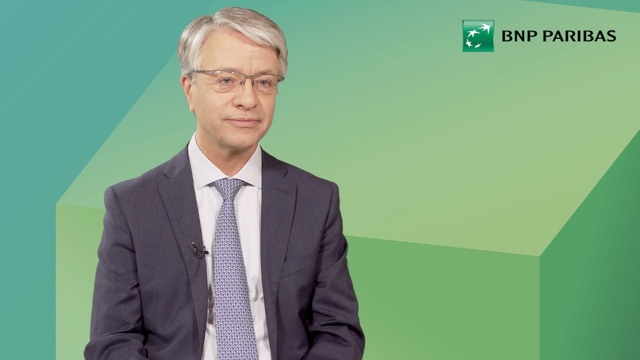EuroBusinessMedia (EBM): BNP Paribas, the euro zone's largest bank, just reported third quarter earnings. Baudouin Prot ,welcome, you are the CEO of BNP Paribas, what are your comments on the company's overall performance in the third quarter?
Baudouin Prot (BP): I think the general comment is that, in a bit less favourable environment in the third quarter than in the first half of this year, we produced another very strong set of results with certainly overall revenues up 25% at group level, which is the product of combining a organic growth of over 6% with the acquisitions we made. And also at profit level, the profits for the group for the quarter stand at 1 675 million euros -- up 25%.
EBM: If we go into the detail of each business, let's begin with capital markets. In equity derivatives we're hearing other banks say that the growth is slowing down as the market for these products becomes more mature. What is your outlook on this line of business - is the growth momentum in equity derivatives indeed beginning to slow down?
BP: We still believe that in equity derivatives we enjoy a very strong position on a worldwide basis in this activity, and that we should still have prospects for good growth. Certainly what we've seen in the last few quarters is still a very strong pipe of innovation and new products that come every quarter, and certainly new asset classes and extended customer reach and customer base -- from corporate customers to hedge funds to asset managers -- so extended reach and extended offer of products. Therefore we believe that we still have good prospects for growth, leveraging also our very strong European platform into the US and also into Asia, where we certainly see growing revenues and growing markets in the years to come. The other thing is that I believe that the entry barriers into this market are getting higher and higher because, with more complex and more sophisticated products, what it takes to enter this market of equity derivatives and to conduct those activities on a secured basis -- in terms of front-office, middle-office, product control, risk management -- it takes really an enormous effort of talents, high IT and investments to be there. We certainly at BNP Paribas enjoy that critical mass, and we're certainly going to leverage it in the near future.
EBM: In corporate banking now, the low interest rate environment of the past couple of years has led to massive borrowing by corporates. Now that interest rates are rising in the US and in Europe, the market is wondering whether your corporate banking business is correlated to interest rates both in terms of revenues, of profitability and of cost of risk?
BP: I want to make several comments - the first is on volume. Regarding volumes, we still consider that the prospect of significant and sustained worldwide growth, and also the strong pipe of mergers & acquisition activity, speak for significant volumes of borrowing.
The second comment regards margins and risks. Regarding margins, certainly we see -- because there is a very high liquidity all over the world in the banking system -- the margins are certainly under pressure, and we don't see that turning around. On the other side, at BNP Paribas, because of a very rigorous approach as a group culture, we have a low cost of risk and we don't see our quality of risk deteriorating -- we have no sign of this on the radar screen. So altogether, in this environment, we do believe that, as we do at BNP Paribas, we need to consider the risk/reward on a case-by-case basis for every transaction -- which we do -- and certainly we need to have the lending activity concentrated in the fields where we have the expertise: structured finance, energy and commodities, structured commodities financing, and all the activities where we enjoy expertise. Now, as regards the 'plain vanilla' lending, so to say, we only do it when we have the potential, by cross-selling other revenues, to get to the proper ROE, in line with what we look for.
EBM: Regarding retail banking in France, should we expect to continue to see double-digit growth in real estate lending, as we've seen for the past couple of years?
BP: Regarding the French market for housing loans and mortgages, I believe that the market is still robust and basically sound. I think that the French demographics are by far the best among certain European countries. The proportion of households who own their homes is still low. The overall level of mortgages-to-revenues is also increasing, but is still low certainly by UK, US and even Spanish comparison. And we still see a lot of mortgages for really buying the first family home, and therefore having repayment as really the central objective, with traditional and non-innovative products being the name of the game. So overall, I still believe that we should enjoy -- even if a bit slower than this year or last year -- a solid growth in mortgage loans over the next few quarters.
EBM: Looking at retail banking in the US now, for the past three years you've invested about 500 million to 1 billion dollars per year to grow Bancwest through acquisitions and opening new branches. Should we expect these investments to continue at the same pace in 2007?
BP: Regarding Bancwest there are several comments I would like to make. The first one is we have in the last 18 months made two big acquisitions in a row, and very close to each other, with Community First and Commercial Federal Bank. These two acquisitions have very much changed the size of our footprint - we now are present in 19 states of Western United States, where before we were mostly a coastal bank in California plus Hawaii. And in this extended footprint we are now working to take full advantage of all of our products set, and to deploy them in the overall footprint. Which, for example, explains that regarding 'ag' business, regarding mid-cap business, regarding private banking, we're making sure that in each of our eight divisional regions we're going to have the full set of products deployed. That will certainly help organic growth of revenues to get the best level. This is even more important to do so in the present time, insofar as we are, at this point of time in the US, in a challenging environment in terms of revenues for every retail bank. This is largely due to do the flat yield curve -- which certainly is a challenge -- and also because of a lot of liquidity in the US retail banking market, there's a lot of pressure on the margins for new loans. So in this environment, we're going to concentrate in the next few quarters on improving and deploying this plan, to make sure that in terms of revenue growth we get to the best level, most probably before we think of moving again on acquisitions. But medium to long term, I do believe that the US, especially the Western part of the United States where we are -- because it has one of the best demographics in the world -- remains a very, very good place for retail banking.
EBM: The recent arrival of Alain Papiasse inside the group was seen by the market as a sign that you want to restructure your asset management business. What positive impact should we expect from such restructuring and within what timeframe?
BP: It seems to me that this question is not quite relevant regarding the kind of present performance we have. Alain Papiasse arrived at the helm of our asset management services business early in 2005. In 2005, and certainly in 2006, the organic growth we enjoyed in this business is from strong to phenomenal. It's better than anybody else. This quarter, the revenues, nearly 100% organic, are up 22.%. And because the costs are up only 19% , the gross operating profit is up not a staggering but a very high 28.5%. So it's not that we need restructuring to be competitive. It's that we already bring results, and this really applies to all of our business there. Take insurance: the revenues are up 34.2% -- all organic -- profit before tax is up 37.7%. So give me a business that grows like that and I don't need restructuring. The same for our custodian business: there the revenues are 27.2 % and profits are up exactly 33.3% pre-tax. And there I want to say, I want to clearly say, we now have in our custody 4.2 trillion US dollars, so I would like BNP Paribas to be now really taken just next to the big US players, right in the league where we are, which is with the big players in global custodian, and we are growing that business 20% with no acquisitions. I don't want to go on an on, but if I would move to real estate services, any of these six businesses, that really are the components of the asset management services, are growing better than ever and better than anybody else, so that's where we are.
EBM: Regarding your recent acquisition of BNL in Italy, can you provide us today with more details about the synergies, and also tell us how much you plan to invest each year in BNL?
BP: Well, regarding BNL, everything you wanted to know about BNL you will learn on the 1st of December in Rome, because we have a big investor day there and I won't tell you in advance all that you are going to learn in Rome. But still, for an acquisition that was completed - we took control on the 28th of April -- not so long ago, I would really say in one sentence that we are perfectly on track. If anything, we are ahead of what I planned: integration is going very, very smoothly, very, very effectively. I'm extremely satisfied with the way the BNP Paribas/BNL integration is going. We're going to comment that in much more detail in Rome, but everything we expected to find and everything we expected to be able to leverage and deliver regarding BNL, we are very much where we thought we would be. Overall, as we said, we're going to leverage the BNL franchise in connection with all of the BNP Paribas business lines that already were present, either corporate investment banking, asset management services or special financial services, that already present in Italy. And Italy as we said is going to be - is already - our second home market in Europe. So we are very, very satisfied so far with what we have found and with the way we are working with our new colleagues at BNL.
EBM: While we await more details on BNL at the December Investor Day, should shareholders in the meantime be concerned that the cost of financing your Italian development will come at the expense of your Tier 1 ratio and your policy on dividends and share buybacks?
BP : The BNP Paribas capital generation and capital management are both very solid, very robust and are not under any pressure from either BNL or any other element. We are going to manage our capital going forward, as we have clearly stated to the market. We want our Tier 1 ratio to be somewhere between 7% and 8%. We are going to continue to have a solid organic growth, I would expect a strong single digit growth for risk-weighted assets. And therefore we are going to continue to deliver the kind of solid dividend policy and the kind of solid overall capital management. And if anything, yesterday our outlook was upgraded by Standard & Poors - and I'll let you read their comments - but I think their comments were that in terms of revenue diversification, management track record and integration, and also the way they characterised the BNL acquisition, and if anything I just read that BNP Paribas has one of the strongest diversifications of any bank in the world. So that's a statement I don't take -- that's Standard & Poors responsibility - but if anything I found this statement on BNP Paribas trends very positive and, in terms of capital structure and capital management, I must say that I was pleased to read that comment and I certainly fully agree with that statement.
EBM: The market was suprised to see you make your move on BNL earlier this year. Are you still interested in these types of acquisition opportunities today, should they present themselves?
BP: As I clearly stated when we made the BNL move, we are still concentrating on the BNL acquisition. The BNL acquisition is a large acquisition, it presents a very significant upside potential and value creation potential for the group, and there is every reason to concentrate - it's very much of what we do, and what I do -- on the BNL integration. So we should not expect BNP Paribas to do any such large acquisitions in the near-term future. We're going to continue to emphasise organic growth in all of our business, we certainly don't exclude small to medium add-on acquisitions in the businesses and in the regions that are very well known to the market. So there should be no surprise. That's certainly the group policy. We have shown once more in this quarter that the BNP Paribas business model, which is really to combine strong organic growth with add-on acquisitions in an adequate way and having always, I would say, retail banking as the core activity of the group, with then corporate investment banking and asset management services very much working to leverage our retail franchise everywhere where we conduct retail banking activities. This is our business model - it's successful as we've shown once again - and we've therefore every reason to stick to it.
EBM: Baudouin Prot, CEO of BNP Paribas, thank you very much.






